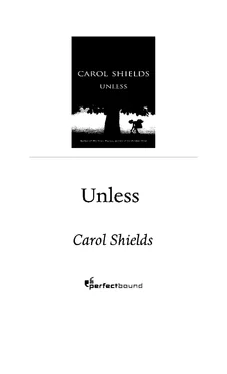Carol Shields - Unless
Здесь есть возможность читать онлайн «Carol Shields - Unless» — ознакомительный отрывок электронной книги совершенно бесплатно, а после прочтения отрывка купить полную версию. В некоторых случаях можно слушать аудио, скачать через торрент в формате fb2 и присутствует краткое содержание. Жанр: Современная проза, на английском языке. Описание произведения, (предисловие) а так же отзывы посетителей доступны на портале библиотеки ЛибКат.
- Название:Unless
- Автор:
- Жанр:
- Год:неизвестен
- ISBN:нет данных
- Рейтинг книги:4 / 5. Голосов: 1
-
Избранное:Добавить в избранное
- Отзывы:
-
Ваша оценка:
- 80
- 1
- 2
- 3
- 4
- 5
Unless: краткое содержание, описание и аннотация
Предлагаем к чтению аннотацию, описание, краткое содержание или предисловие (зависит от того, что написал сам автор книги «Unless»). Если вы не нашли необходимую информацию о книге — напишите в комментариях, мы постараемся отыскать её.
Unless — читать онлайн ознакомительный отрывок
Ниже представлен текст книги, разбитый по страницам. Система сохранения места последней прочитанной страницы, позволяет с удобством читать онлайн бесплатно книгу «Unless», без необходимости каждый раз заново искать на чём Вы остановились. Поставьте закладку, и сможете в любой момент перейти на страницу, на которой закончили чтение.
Интервал:
Закладка:
Unplug coffee maker. Help Tom find his calendar, which is under yesterday’s mail. Hug, hug, and he’s off. Let the dog out for a few minutes. Phone Tom’s mother to see if she slept well.
Check outdoor temperature, minus ten. Finally, back car out of the garage, drive into Toronto.
The drive is endless, repetitive, the colour of cement. It takes an hour — now it’s ten-thirty, and I park near Norah’s corner.
I walk around and around the block where she sits, trying to keep a little distance. I don’t want to threaten her in any way. O my love, what have they done to you? Her face: I don’t dare get close enough to see her face clearly, but what I imagine is a passive despair, a mingling of contempt and indifference that projects silence but is ready to incinerate whatever is offered. In this oppressive weather — snow in the air, a driving wind — she is more isolated than ever. This is a nervous, feverish corner of the city, rowdy, cheap, and lonely.
Across the street is Honest Ed’s, an immense and eccentric discount department store with uneven flooring and everything on sale, from clothes pegs to TV sets. But Norah’s posture excludes everything around her, as though nothing is real except for her bent head and neck.
The fact that I am unseen — that I can remain unseen — is oddly comforting, as though I am giving her something of value but which is really just my steady, resolute, useless anxiety. I wander into the local shops and observe her through the windows. I circle the street and count how many people walk by her, how many give her a coin or two. Sometimes I feel she is aware of my presence. When I finally approach her with a parcel of food, she doesn’t look up.
At noon I go to Danielle Westerman’s Rosedale apartment and eat small sandwiches at a table set up in her sunroom, wonderful catered sandwiches, crabmeat, artichoke, curried chicken. These days I am almost her only visitor. A beautiful cloth covers the little table, and small ladylike napkins, professionally laundered, standing up in crisp points. We drink very strong tea from Russian glasses; this is one of Danielle’s affectations. Her hair has been dyed so often it has grown into a soft rust and purple turban. One of her hands touches her hair, which is coming unpinned and threatening to fall over her eyes. Once, years ago, she wore her hair brushed straight back from her forehead and ears and caught in a shining chignon — which is how I wear my hair now; a tribute — and not unconscious at all — to young Danielle, early Danielle, that vibrant girl-woman who reinvented feminism. Nowadays she wears tiny gold and white shoes that look like bedroom slippers, and her bare legs are much marked with bruises and spots. Her pleated grey skirt and cardigan are part of her daily uniform, as they have been for years. Where does she find such terrible cardigans? I marvel at the number of years locked up in her body, all she has seen and thought, all the words she has lined up on the page, the weather she’s endured, the lovers she’s encountered, the suffering during the war. We talk about volume four of the translation, which I am not, to her consternation, doing, and then, after a little while, we discuss the problems of Alicia and Roman in my new novel, which is finally on the trajectory it was meant to have. We raise our tea glasses to the memory of Mr. Scribano, and Danielle wonders for the thousandth time whether Scribano can possibly have been his real name or one adopted when he found his vocation. I rise, finally, bend down to hug her fragile body, and insist that I will let myself out the door. I can see that she is nodding off to sleep.
After that I take one more slow drive past Bloor and Bathurst before heading for the highway and home, looking for that familiar gallant self in its navy peacoat, that bent head, wrapped now in a scarf, awarding myself the easy pleasure that people invite when nothing has improved but at least nothing has changed. Still there. Still there. A dithering reassurance that pulls against the gravity of mourning. Never mind the car behind me impatiently honking. I take my time.
Notwithstanding
Tom and I still have sex — have I mentioned this? — even though our oldest daughter is living on the street, a derelict. This happens once or twice a week. We actually lie on our queen-size bed together; it will be midnight, the house quiet, our faces close together, the warm, felt cave beneath Tom’s jaw at my cheek, his breath. The specificity of his body keeps me still, as though I’m listening for a signal. He reaches for me; I respond, sometimes slowly, lately quite slowly. Spirals of transcendence drift through me like strands of DNA, always rising upward. Concentrate, concentrate; yes, concentration helps. Soon we are rocking together like a pair of hard-breathing lunatics, and afterwards one or the other of us will cry.
Sometimes we both cry. Our ongoing need for sex lies between us like something we don’t dare pick up. It’s as though we have struggled to enter an interior sleep-room where the capacity for suffering has withered. The hum in our ears is our own history, and that hum never goes away.
Do we still love each other? We must if we’re still having sex after twenty-plus years. Of course we have our quarrels, but never anything we can’t find our way back from. The question of love is not relevant in our case, not for the moment. The question can be postponed. We live in each other’s shelter; we fit. We’re together after all this time; that’s what matters. When we go for a walk together, his arm is locked into my arm, his hand is locked into my hand. Since I’m several inches shorter, this requires a lifting of my shoulder and a slight stoop on his part. We fit together that way. The sex part of our life is also a matter of minute adjustment and accommodation. Our habits are so familiar; they’re like the interiors of uncurtained houses at night, a reassuring wedge of known lamplight, a corner of a familiar ceiling cornice, a wall of books, the top of a wing chair, always there, the same arrangements.
“How odd,” I said to him after some particularly aggressive lovemaking (the middle of November, the night of the season’s first real snow storm).
“Odd?”
“That we go on doing this.”
“I know.”
“The same way we keep up the garden.”
“And pay the bills.”
“Can you forget, Tom? Tell me. Are you ever able to forget about her?”
A pause, then, “I don’t think so. Not completely. Never. Do you?” (I do love him. When I ask him a question, he asks back.)
“No.”
We must have drifted off to sleep after that conversation. (So there it is: we have regular sex and we are able, mostly, to sleep. It’s almost negligent of us, two heartbroken parents; yet to all appearances, we are able to carry on with our lives.)
A hundred elements of today’s culture outrage me, particularly the easy unthinkingness of people’s claim to “spirituality,” but I remain forever grateful for the good scrambled liberated days Tom and I came out of, the seventies. “To be young was very heaven,” sang old Wordsworth, and we had that heaven, a taste of it anyway, the veryness of it. We had sex the first night we met, Tom and I, two students sitting side by side at a human rights rally in Nathan Phillips Square in downtown Toronto. We fell to talking, then walking around the downtown streets, then back to Tom’s apartment on Davenport, the brown couch he had with the awful-smelling corduroy cushions, each one centred with a big hard brown button. I didn’t phone home. I didn’t phone the dorm. This was during a time when I seemed to have very little in the way of a real life, and now here I was, lying beside a man I’d just met. Two strangers held together in a save-the-earth era. Tom’s hand had been under my sweater all the way from downtown Toronto. I was on the pill, there was nothing to discuss, nothing could have stopped us, it was like flying. I remember, afterwards, studying his face, trying to see what passion had accomplished, and grieving for just a moment that there wouldn’t, couldn’t, be another event quite equal to this, not if I lived to be a hundred.
Читать дальшеИнтервал:
Закладка:
Похожие книги на «Unless»
Представляем Вашему вниманию похожие книги на «Unless» списком для выбора. Мы отобрали схожую по названию и смыслу литературу в надежде предоставить читателям больше вариантов отыскать новые, интересные, ещё непрочитанные произведения.
Обсуждение, отзывы о книге «Unless» и просто собственные мнения читателей. Оставьте ваши комментарии, напишите, что Вы думаете о произведении, его смысле или главных героях. Укажите что конкретно понравилось, а что нет, и почему Вы так считаете.












